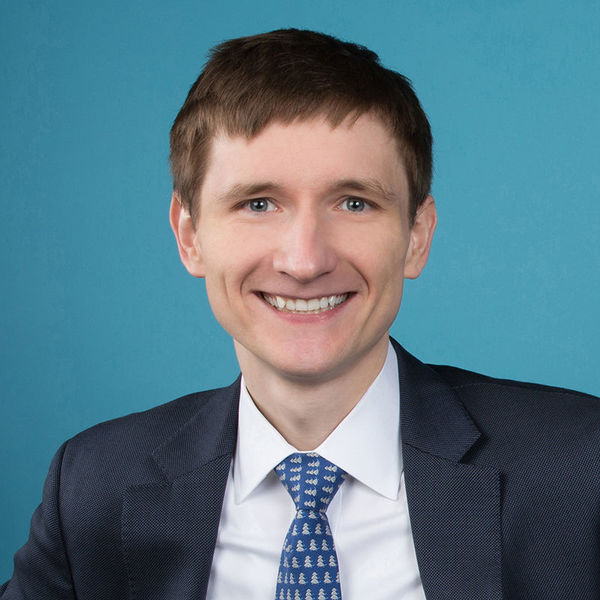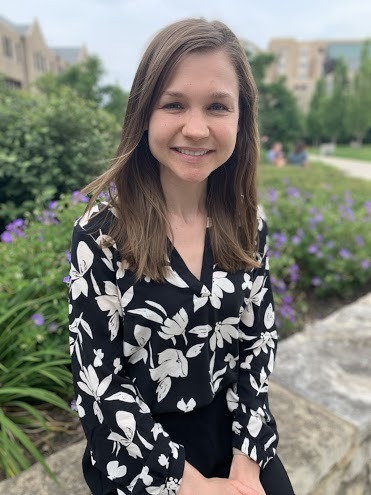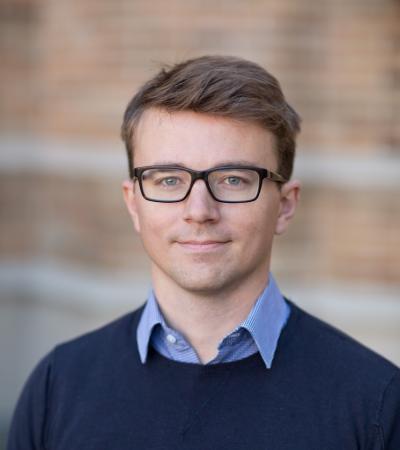Three new members of the regular faculty and one visiting professor have joined the Department of Economics at the University of Notre Dame for the 2020-2021 academic year. These additions come on top of several years of impressive growth. The department now boasts 44 members of the regular faculty, up from 34 in the 2015-2016 academic year.
The new hires include associate professor Maciej Kotowski, assistant professor Matthias Hoelzlein, assistant research professor Mary Kate Batistich, and visiting assistant professor Maximilian Goedl. “We are delighted to welcome Maciej, Matthias, Mary Kate, and Max to the economics family at Notre Dame,” said Eric Sims, department chair and Michael P. Grace II Collegiate Professor of Economics. “Our hiring this past cycle significantly strengthens the research and teaching missions of the department. Maciej provides a much-needed addition to our theory group. Mary Kate is a trained labor economist with interests in trade and development who diversifies both the skill-set and interests of the Lab for Economic Opportunities. Matthias is a promising young scholar working in a burgeoning field that sits at the intersection of international trade and urban economics. Max contributes to our large and diverse macro group and provides some much-needed help with staffing classes for our growing undergraduate major.”

Maciej Kotowski
Maciej Kotowski is an economic theorist with particular interest in auctions, market design, matching markets, and economic networks. His current projects focus on the interpretation and implications of property rights in economic models, the properties of dynamic and multiperiod matching markets, and the formation of trading networks. Maciej earned his Ph.D. from the University of California, Berkeley in 2011 and his B.A. from McGill University in 2006. He comes to Notre Dame after having been an assistant professor at Harvard’s Kennedy School of Government. He is teaching an undergraduate course on market design in the fall term and will be teaching in the first-year micro theory sequence for the PhD program in the spring.
Concerning his move to Notre Dame, Maciej said: “The Notre Dame Economics Department is brimming with ambition and energy. These make it a vibrant and exciting place to be. I’m excited by the department’s research, teaching, and public service missions, and I hope to contribute to its continued growth.”

Matthias Hoelzlein
Matthias Hoelzlein works on topics at the intersection of international trade, urban economics, and economic geography. His research agenda is centered on how heterogeneous agents’ exposure to local markets determines welfare and distributional effects of shocks such as policy interventions. Before joining Notre Dame in 2020, Matthias received his Ph.D. in Economics from the University of California, Berkeley, in 2020 and a Master’s degree (German equivalent) in Business and Engineering from the Karlsruhe Institute of Technology in 2010. His current working papers include “Two-Sided Sorting and Spatial Inequality in Cities” (job market paper) and “Scaling Up Agricultural Policy Interventions: Theory and Evidence from Uganda (with Lauren Bergquist, Thibault Fally, Benjamin Faber, Edward Miguel, and Andres Rodriguez-Clare).
Hoelzlein will be teaching a new course called Cities and Economic Geography in both terms of the coming academic year. He said that he chose Notre Dame because it “stands out as a perfect combination of communal spirit with great opportunities to advance my academic career.”

Mary Kate Batistich
Joining the Department of Economics is a homecoming of sorts for Mary Kate Batistisch, who received her BA in economics from Notre Dame in 2012. Her research focuses on domestic poverty, including its connection to homelessness, crime, labor markets, and health care. She also has work quantifying the roles of international trade and technology on the loss of manufacturing employment in the U.S., with special attention to black and non-college workers. She joins the department as an assistant research professor affiliated with the Wilson Sheehan Lab for Economic Opportunities. She completed her PhD in economics at Purdue University in 2020. Her working papers include “Skill-Biased Technical Change and Employment in U.S. Manufacturing” (job market paper) and “Stalled Racial Progress and Japanese Trade in the 1970’s-1980s” (with Timothy N. Bond).
Mary Kate was attracted to Notre Dame because of “the chance to learn from, and partner with, the outstanding faculty here.”

Maximilian Goedl
Prior to joining the Department of Economics in 2020, Maximilian Goedl was a Visiting Assistant Professor at the Keough School of Global Affairs as well as a Visiting Fellow at the Kellogg Institute for International Studies at Notre Dame. Max received his doctorate in economics in 2017 from the University of Graz, Austria. His primary research interests are at the intersection of international macroeconomics and public finance with a focus on the Eurozone crisis. He has spent research visits at the University of California at Berkeley as well as at the Institute for the World Economy in Kiel, Germany. He has taught courses in international economics and
macroeconomics at Notre Dame as well as at the University of Graz. Goedl will be teaching undergraduate courses in macro and international economics for the coming academic year.
About the Department of Economics
The Department of Economics at Notre Dame is internationally recognized for its contributions to academic research and economic policymaking. It boasts more than 40 regular faculty members, one of the largest undergraduate majors at Notre Dame, and a doctoral program with more than 40 PhD students. It is ranked in the top quartile of economics departments in the United States by Ideas/RePEc. The department is committed to providing the highest quality instruction in modern economic analysis and to conducting innovative, policy-relevant research, all while fostering and contributing to the Catholic mission of the University of Notre Dame.